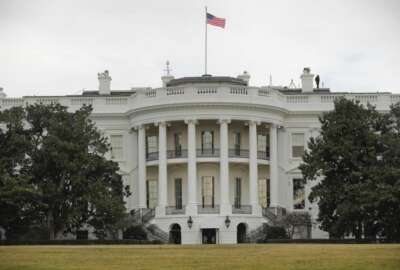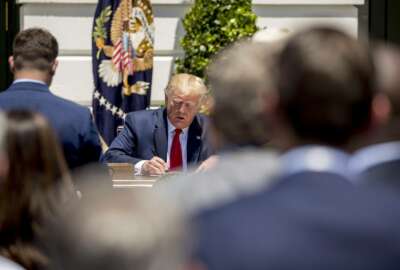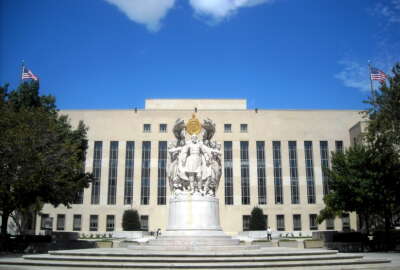
Injunction on Trump’s workforce executive orders has expired
The injunction on the president's workforce executive orders has expired, clearing the way for agencies to officially begin implementing them again.
An injunction on the president’s workforce executive orders expired Wednesday, opening the door for agencies to eventually begin implementing them.
The U.S. Court of Appeals for the District of Columbia Circuit last week denied federal employee unions a chance for a rehearing on the merits of President Donald Trump’s executive orders on collective bargaining, official time and employee removals.
Last week’s decision from the appeals court cleared the way for the panel to formally lift the injunction on the president’s EOs seven days later, which is today.
Legal battles over the president’s three workforce executive orders have stretched on for more than a year.
“Although we were able to shield federal employees from much of the damage so far, the lifting of the court-ordered injunction is a sad day for the employees who serve this country,” Tony Reardon, president of the National Treasury Employees Union, said Wednesday in a statement.
NTEU, the American Federation of Government Employees and several other federal employee unions have been actively trying to block the workforce executive orders.
The unions sued the Trump administration last June over the president’s workforce executive orders on collective bargaining, official time and employee removals, in August had asked a full panel of judges to rehear their case.
Their request followed a decision from a three-judge panel on the U.S. Court of Appeals, which in July had overturned an August 2018 decision from a federal district court. The panel said the lower court didn’t have jurisdiction to invalidate portions of the president’s executive orders but denied the Trump administration an opportunity to immediately begin enforcing them.
The injunction had been in place since last August, when a federal district court invalidated nine key provisions from Trump’s workforce executive orders. That meant agencies, technically, couldn’t set strict limits on union representatives’ use of official time or ban the organizations from using government office space.
Federal employees unions, however, have said they’ve continued to experience direct impacts of the president’s EOs over the past year while legal battles have continued.
The Trump administration appealed the federal district court’s decision last September.
But in July, the appeals court dismissed the lower court’s decision because, as the three judges argued, the lower court lacked jurisdiction in ruling on the case. The appeals court didn’t weigh in on the legal merits of the president’s workforce executive orders, a point that had ultimately fueled the unions’ request for a rehearing.
Throughout these legal battles, the government has maintained that federal employee unions should take their complaints with Trump’s workforce executive orders in specific collective bargaining instances to the Federal Labor Relations Authority.
Meanwhile, unions’ complaints with the current state of collective bargaining have been piling up over the last year.
The Department of Health and Human Services is implementing a series of new articles that its union, the National Treasury Employees Union, said it hasn’t agreed to. Most of the articles closely resemble a decision from the Federal Service Impasses Panel, which stepped in to break up what HHS described as a deadlock between it and NTEU.
After a series of similarly contentious negotiations between the Education Department and AFGE, Education announced plans to enforce new articles on telework, employee performance management and other topics once included in the two parties’ collective bargaining agreement.
The Department of Veterans Affairs has limited official time for some 104,000 medical professionals within the agency, and it’s currently pursuing additional limits in its bargaining negotiations with AFGE.
“NTEU and other federal sector unions will continue to fight these illegal executive orders through whatever means available,” Reardon said. “In the meantime, it is important to point out that federal employees remain committed to their jobs, their agencies and their fellow taxpayers. Even as the administration disparages them and their contributions to our country, federal employees are carrying out their duties with professionalism and they are to be commended.”
Copyright © 2024 Federal News Network. All rights reserved. This website is not intended for users located within the European Economic Area.
Nicole Ogrysko is a reporter for Federal News Network focusing on the federal workforce and federal pay and benefits.
Follow @nogryskoWFED






